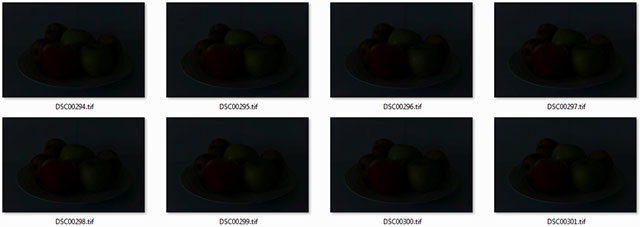For me it seems reasonable that if I kept my gaze on a fixed point in a room with low light, a progressively brighter and better picture would appear before my eyes, just like a camera can see in the dark if the shutter speeedspeed is really slow, e.g. 4 seconds exposure. Why can't our brain do this trick as well (accumulate visual information over time)? Or is it a limitation of the eyes?
edit:
To further clarify what I'm after; I will show a concrete example from the world of photography (images taken from this website).
Here is an example where we have a series of underexposed images - this would be what the brain receives:

Now, combining all of them with a simple add-operation reveals one image that has normal exposure.

This seems like a simple trick for our powerful brain - surely it can add incoming signals?
